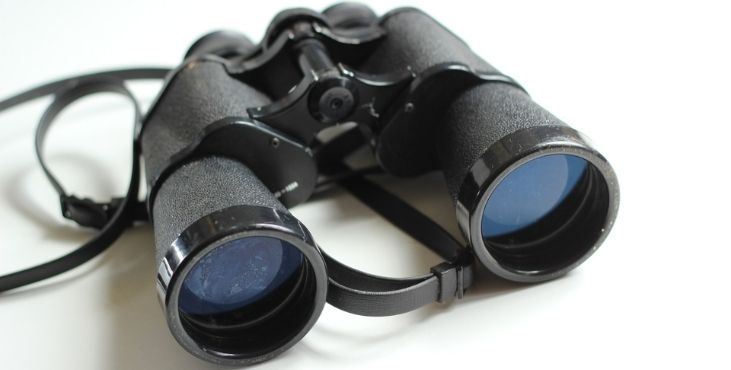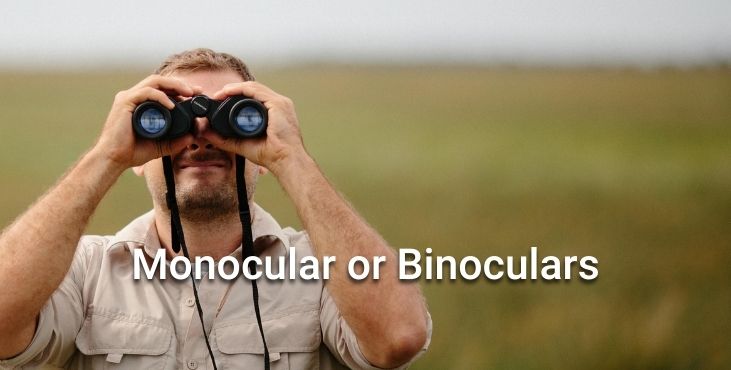The difference between binoculars and a monocular is pretty obvious on the surface. Mono meaning one or single and Bi meaning two ocular to do with eyes, vision or lenses. Whether you should buy a monocular or binoculars depends on a number of factors.
Contents
Size And Weight
Monoculars are generally smaller and weigh far less than binoculars, making them easier to carry and conceal. If this is a necessary requirement then you need read no further, a monocular is your only choice – Or is it? There are compact binoculars available that are also small and weigh far less than full size binoculars.
Magnification
The higher the level of magnification, the more detail you’ll be able to see. With that said, it is almost impossible to keep any optics perfectly still, which means the image will become less clear if you are shaking. A shaky image under exaggerated magnification will be blurry.
So we recommend no greater than 12X for hand held binoculars and 8X for a monocular. 12X means everything viewed through the lens will appear 12 times larger than with the naked eye. Any magnification above our recommended levels could result in a blurry, shaking image.
Objective Lens Diameter
This is the most important factor of any optical device. The objective lens is the lens closest to the objects you are viewing (furthest away from your eye). The objective lens is the only way light has to enter the optical device and therefore the only way the viewed objects are illuminated.
The larger the objective lens the brighter the objects will appear, but also the heavier the optical device will be. The objective lens diameter is always written in millimetres and the whole number system will look something like;10 X 30 or 8 X 25
The first number is always the magnification (with the X signifying times) and the last number being the objective lens diameter.
When it comes to monoculars it’s always best to get the largest objective lens diameter as possible to be sure of a clear image.
The Differences Between Monoculars & Binoculars

In general, binoculars will always produce a better quality image due to stereoscopic vision as opposed to the monoculars monovision. Binoculars are considered better for long distance viewing whereas monoculars are considered best for closer viewing.
Binoculars are considered to be less tiring on your eyes than a monocular which tires one eye constantly – But using a monocular gives you the option to swap the dominant eye giving the other one a rest while still observing whatever you’re watching.
Monoculars definitely give you a greater price to quality ratio, are easy to use, require no setting up or focusing and are great for covert work. Another often overlooked benefit of using a monocular over binoculars is at night. If you need to use night vision optics, they can leave you eyesight dazzled for the first few minutes after use.
If you’ve been using night vision binoculars, you are effectively blind for that few minutes until your eyes get used to the dark again. Using a night vision monocular leaves one eye free from dazzle, allowing you to carry on after use with no interruption or problems.
Activities And Optics
There are a number of activities that need optical enhancement of some kind. Let’s have a look at some specific activities and see whether binoculars or a monocular are best suited.
Bird Watching
It is possible to use a monocular for bird watching, but a decent pair of binoculars are better suited to the needs of the bird watcher. Binoculars have a wide field of view, which means you can see a wider area through the lens, very handy when trying to spot birds at some way off in the distance. Binoculars cause less eye strain than a monocular over long periods.
But a monocular needs no focusing or setting up in any way, you just lift it to your eye, point at the bird you’re trying to see and that’s it. However, binoculars weigh more, are far larger and will cost more. If you’re really only out for a stroll and bird watching is secondary, then a monocular will be more convenient, if birding is why you’re out for a stroll then binoculars will suit you better.
Hunting
Binoculars work better in low light conditions and have a greater depth of field making them better suited to tracking your quarry and stalking them too. They will also show up many details that a monocular is incapable of. A monocular is the faster of the two to operate; however, binoculars will give you all of the information you need quicker and more accurately.
Hiking
If you’re out for a day’s hike, a monocular should be your first choice. A monocular is easy to use, needs no setting up or focusing, compact and lightweight. The other option is a pair of compact folding binoculars, but these need refocusing after every use and take time to set up.
Stargazing
For stargazing and astronomy, you really need a high powered optical device. That means either a telescope, spotting scope or high powered binoculars, but not a monocular. A monocular is just not going to be powerful enough for searching the galaxy for planets, stars etc.
Indoor Use
If you are a regular theatre goer or if you frequent museums or art galleries, a monocular is the perfect optical accompaniment.Small, lightweight, unobtrusive, fits neatly in your pocket and doesn’t look out of place in an indoor environment. Binoculars on the other hand, would look extremely odd in an art gallery or museum.
Night Vision
As we said earlier, for use at night, a monocular is a great choice. No night blindness to worry about or impaired vision of any sort. Security officers and ex-military men have told us they prefer to use a monocular for night vision exercises.
City Use
If you like to walk in the park and observe the wildlife, the use of binoculars can be misconstrued. People see binoculars in public places and assume you’re a stalker, spy, private detective or a pervert. A monocular allows you to pursue your hobby in a far more discreet manner. However, binoculars will show you more detail than a monocular ever can.
In Summary
The reality is, both binoculars and monoculars have their place in the world of enhanced vision optics and one will never replace the other. If your budget allows, we would suggest investing in both unless your particular hobby has been highlighted as being more suited to one specific device. In just the same way as you wouldn’t use opera glasses to bird watch, there are specific tools for specific situations.
So we suggest you write a pros and cons list for whatever activity you are engaged in and weigh up which is best suited, binoculars or a monocular.

Leave a Reply